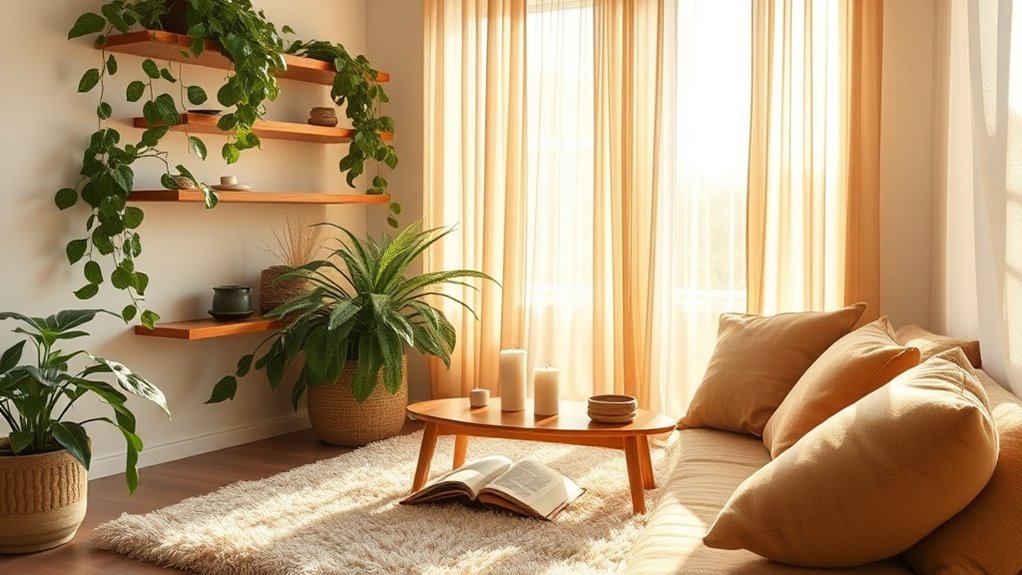The One Sound You Should Add to Your Night Routine
If you’re looking to enhance your night routine, consider adding gentle rain sounds. This soothing audio masks distractions, lowers stress, and promotes relaxation. The calming atmosphere it creates can significantly improve your sleep quality while elevating your mood. It’s a simple yet effective way to signal your body it’s time to unwind. Experiment with different sounds to see what resonates with you. Discovering the right sound can transform your evenings into a peaceful retreat.
Understanding Sound Therapy
Sound therapy is a powerful tool that can transform your night routine, helping you unwind and prepare for restful sleep. By engaging with soothing sounds, you create a calming environment that encourages relaxation.
A great sound therapy tip is to choose gentle nature sounds or soft instrumental music, which can mask distracting noise and lower stress levels. Experiment with various audio tracks to find what resonates with you. Incorporating these soothing sounds into your evening rituals not only enhances your sleep quality but also nurtures a deeper connection to your inner calm, guiding you toward a more peaceful night.
Benefits of Incorporating Sound Into Your Night Routine
How can you enhance your night routine for better sleep? Incorporating sound can significantly improve your relaxation and sleep quality. Sounds like gentle music, nature, or white noise create a calming atmosphere, reducing stress and promoting tranquility. This aids in falling asleep faster and enjoying deeper rest. Research indicates that sound relaxation techniques can play a crucial role in setting the stage for quality sleep.
| Benefit | Explanation | Impact |
|---|---|---|
| Reduces Anxiety | Soothing sounds lower stress levels | Improved mood |
| Enhances Focus | Sound promotes mindfulness | Better relaxation |
| Increases Sleep Quality | Sound helps maintain sleep cycles | Restorative sleep |
| Boosts Mood | Pleasant sounds elevate spirits | Overall well-being |
| Promotes Routine | Sounds signal bedtime | Consistency |
Types of Sounds for Relaxation
Incorporating the right types of sounds into your night routine can transform your relaxation experience.
Nature sounds, like gentle rain or ocean waves, promote a calming atmosphere, grounding you after a hectic day.
Soft instrumental music, such as classical or ambient tunes, can soothe your mind and ease tension.
White noise, including fan sounds or soft static, helps mask distractions and creates a cocoon of tranquility.
Consider guided meditations or calming podcasts that encourage mindfulness and deep relaxation.
Each type of sound serves a unique purpose, allowing you to customize your nighttime environment for optimal rest and rejuvenation. Adding calming sound tips to your routine can create additional moments of peace throughout your day.
How to Choose the Right Sound for You
Finding the right sound for your night routine can significantly enhance your ability to unwind.
Start by considering your personal preferences—do you lean towards nature sounds, soft music, or white noise?
Experiment with different options to see which resonates with you.
Pay attention to how each sound affects your mood and relaxation levels.
You might also want to reflect on your past experiences; familiar sounds can evoke feelings of comfort.
Remember, the goal is to create an atmosphere that promotes calmness. Incorporating sound healing habits can further assist in achieving a deeper sense of relaxation.
Trust your instincts, and don’t hesitate to change things up if something isn’t working for you.
Tips for Integrating Sound Therapy Into Your Evening Ritual
Sound therapy can be a transformative addition to your evening ritual, helping you transition from the day’s chaos to a state of tranquility.
Start by creating a dedicated space where you can relax, free from distractions.
Choose calming sounds that resonate with you, like gentle rain or soft instrumental music.
Incorporate sound therapy into your routine by playing these sounds during activities like reading, meditating, or taking a warm bath.
Gradually, allow yourself to ease into the experience, focusing on your breath.
This intentional practice can help signal your body that it’s time to unwind and prepare for restful sleep.





